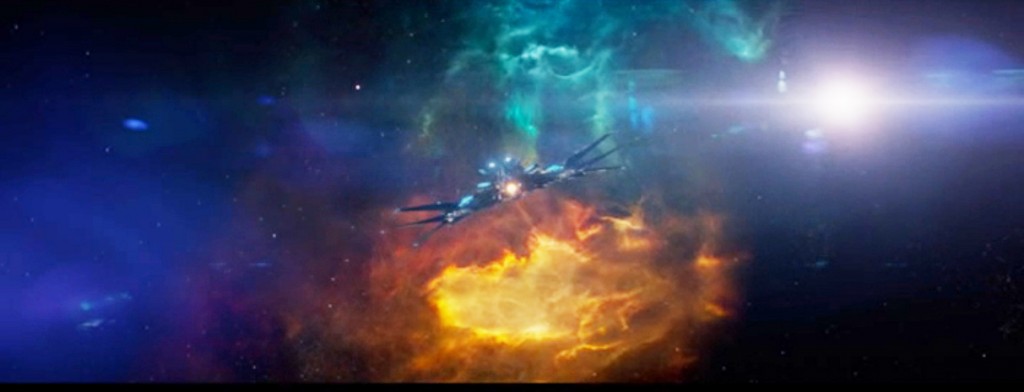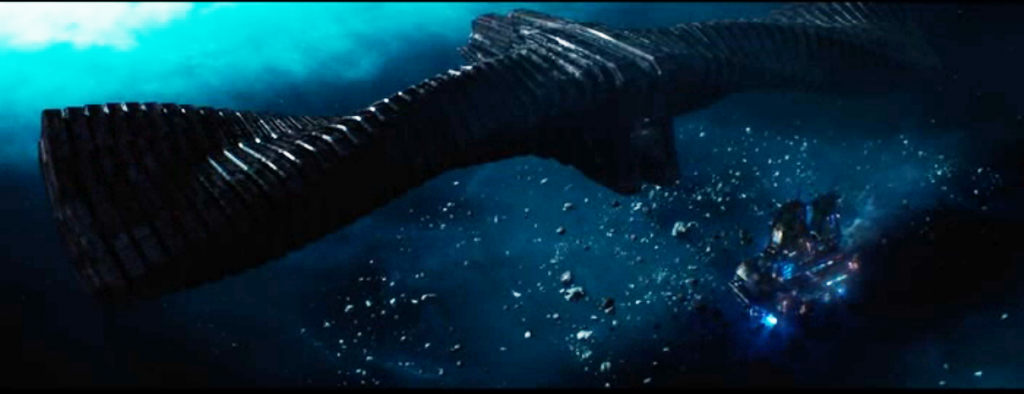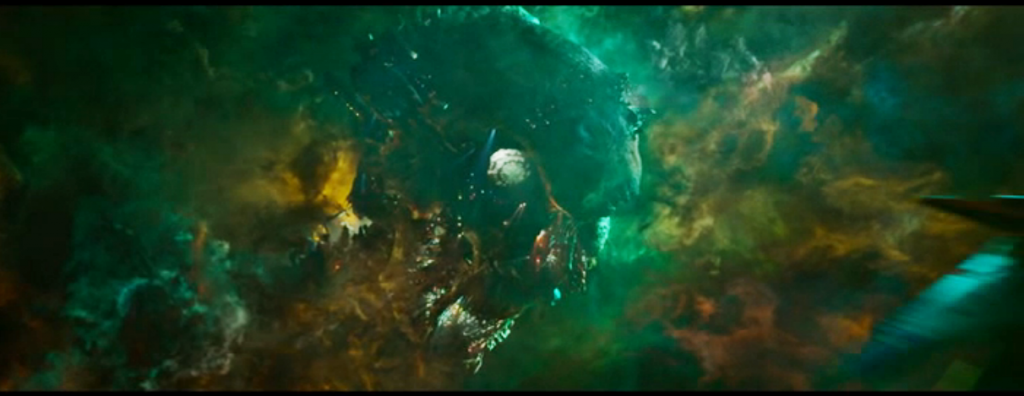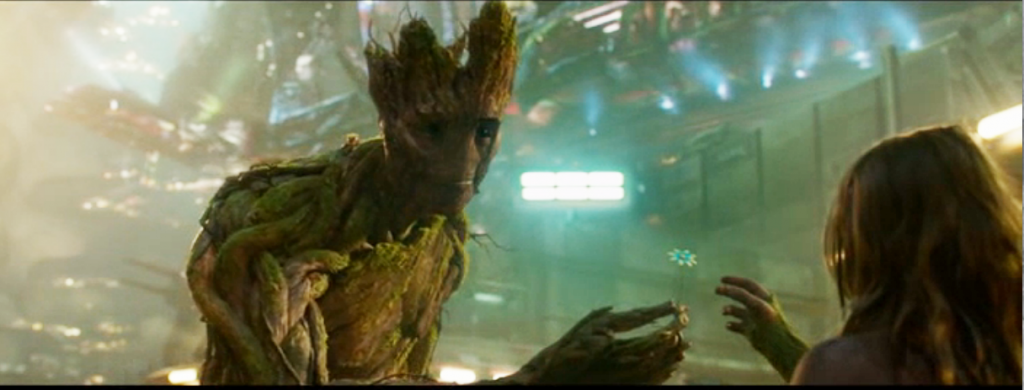Guardians of the Galaxy part 6
At the top of Act II, protagonist Peter Quill now has a whole team of weird aliens on his ship the Milano (named after Alyssa?) getting into his stuff. For individualist Peter, this is a mixed blessing. Like James Bond, Peter’s natural state is being alone, or, at worst, alone with a throwaway lady-friend. Now he’s got a raccoon rummaging through his belongings, including the mysterious box his mother gave to him when she died, which is still unopened. Gamora sums up the situation best for everyone when she says “We have an agreement, but I would never be partners with the likes of you.” When Guardians came out, I read a number of think-pieces in our nation’s media outlets written by people who just threw up their hands at the breathless anything-goes zaniness of the movie. I have no idea what those people were talking about. Guardians possesses one of the most time-honored stories imaginable; a rag-tag bunch of misfits who can’t stand each other team up to save a society they don’t belong in. That’s it, that’s the whole story. You put a raccoon and a tree and a few bald, blue aliens into that narrative and apparently people get really confused.
As Peter and his ill-suited friends head toward Gamora’s mysterious buyer (is it the same buyer the Broker was buying for?) Ronan arrives at the Kyln looking for the orb. When he does not find it, he orders Nebula to murder everyone in the place. Even though she is a trained assassin, that seems like a pretty tall order, if only for the time it would take! Gamora, Nebula’s “better” sister, was frightened for her life in the Kyln, why does Ronan think Nebula can “cleanse” the Kyln all on her own?
Down on Xandar, Yondu goes to see the Broker. Yondu, it appears, has no idea what the orb is; like Peter, he’s merely a thief, not a collector. For that, we need to meet the Collector. We find him in his (house? museum? showroom?) threatening his pink young female assistant with what appears to be a fate worse than death. His previous assistant, we see, now lives in a glass vivarium with electrodes stuck to her head. Whatever she did (she “displeased” the Collector), his new assistant doesn’t want it to happen to her. There’s kind of a grim picture of leadership in the galaxy of Guardians; the Collector is the fourth team-leader we’ve come across who rules with brutality and intimidation. Thanos sits in a floaty chair and pushes Ronan around, Ronan gives orders to underlings, crushes people’s heads with his magic hammer (sometimes just by waving it at them) and bathes in the blood of his enemies, and Yondu threatens those who cross him with a magic whistle-arrow. The problem with this kind of rule is that it inspires like revolt. Ronan despises Thanos, Gamora and Nebula despise both Thanos and Ronan, and Drax lives only to destroy Ronan. Even anarchist Rocket wants to “blow up moons.” Only Yondu’s team of space-pirates seem to have any affection for their cantankerous leader. That’s another way Peter stands out in this harsh, cruel galaxy: he just wants to be left alone, listen to music and get laid. His spiritual forebears are Han Solo, Spike from Cowboy Bebop and Mal from Firefly. Guardians would have made a great three-part Firefly episode, and almost is.
We now come to Knowhere, an outlaw establishment built inside the severed head of a giant creature. So far in Guardians, the locations we’ve seen are an abandoned wreck of a planet, a stormy industrial ruin, a sunny utopia, a bleak strew of asteroids and a maximum-security prison. The Kyln may have the most rules, but not necessarily. One of the reasons I think everyone has such little patience with Xandar is that, for all its “niceness,” it probably has a ton of rules to make everything awesome. (It is, after all, the seat of the Nova Corps.) The Kyln, meanwhile, may be a prison but the inmates there are more or less free to construct their own society. Thanos’s asteroid-ville has only one rule, but it’s a big one: obey Thanos or die. The dead or dying planets we’ve seen have no government left on them to make rules. That’s why piracy appeals to people like Peter: when you have your own ship, you make the rules. A location like Knowhere, with its absence of regulation, is like the Kowloon Walled City of space — so far outside the law, no one dares go there. If mining the insides of a dead alien’s skull sounds like a good place to put down stakes, this is what freedom looks like.
Peter says he feels at home in Knowhere because he’s “from a planet of outlaws,” but he’s only half-joking. No child of Earth feels like he lives in a world without rules. When a passel of children approach, he immediately takes them for pickpockets, while Groot is charmed by them and gives a girl a flower. We can’t imagine Peter having kids, but Groot, big dummy that he is, is all heart. This is his “save the cat” moment, where our heart goes out to him and his innocence. In a world founded by criminals and absent any laws, he still finds an opportunity for a moment of common decency.
While the gang waits to meet the Collector, the movie takes a beat to let everyone relax. Drax, Rocket and Groot get drunk while Peter makes time with Gamora. What do these scenes accomplish? They allow Drax to bond with Rocket and Groot (funny how alcohol does that) and they allow us to get to know both Gamora and Peter better. We learn that Gamora was kidnapped by Thanos after he killed her family (another orphan in the storm), and we learn that Peter’s Walkman (and Awesome Mix) was a gift from his mother. Finally, as Peter tries to get a leg over with Gamora, the movie’s central theme is one again proffered. “What do you do with [your Walkman]?” asks Gamora. “Nothing,” says Peter, “You listen to it. You dance.” For Gamora, a warrior and assassin, there is no such thing as dancing. Peter relates the plot of Footloose, and while the beat lands as a joke, the scene is the heart of the movie. Footloose is only a dumb movie, the cinematic equivalent of “Hooked on a Feeling,” but, like the radio-friendly love songs that suddenly seem very deep when you’re going through a breakup, Footloose, in spite of being a corporate-produced boxing-glove of a narrative, means the world to Peter (his mother probably took him to see it). When I was 15 in 1977, my friends and I went to see Star Wars when it opened and it was like a portal into another world opened up. When the movie ended, there was no discussion, we all knew we were going to sit right where we were and watch it again. It, too, was a “dumb movie,” a piece of junk culture assembled from the spare parts of older pieces of junk culture (much like the design aesthetic of both Star Wars and Guardians), but the world it took us to was stuffed full of meanings we knew to be true. Guardians perhaps knows it can’t compete with the cultural impact of Star Wars (being so much an echo of it already), but that same joy, that reveling in the home truths of junk culture is imbedded in every frame.




James Gunn has confirmed that the Milano was named after Alyssa Milano.
Is being alone with a lady-friend worse than being just alone? I guess if she’s trying to rip out your thorax.
I think if you can’t remember your lady-friend’s name, your natural state is solitude.
“Guardians perhaps knows it can’t compete with the cultural impact of Star Wars”
When ‘Guardians’ was out I heard several fans say that they felt like it was ‘This generation’s Star Wars.’ But even though ‘Guardians’ will probably be the biggest hit film of 2014 (in the U.S., at least), it’s clearly not a paradigm-shifting hit on the level ‘Star Wars’ was.
I wonder, though, if “this generation’s ‘Star Wars’ could be the collective films of the Marvel Cinematic Universe. I’m thinking not so much of any Marvel movie, but the “shared universe” of movies from the first Iron Man to Guardians and theoretically extending to ‘The Avengers: Infinity War 1 and 2.’ Not only are some of these huge worldwide hits (and some of them are genuinely terrific movies), but the idea of making a series of interlocking genre films seems to be massively influential among the contemporary movie studios. It’s like everyone seems to want to have their own ‘shared universe’ franchise, even if their properties don’t necessarily support it (ex., the current Spider-Man series, the proposed Universal Monsters series, rumors that new King Arthur and Robin Hood movies could launch series). But I can’t say I know enough about the business of moviemaking to say that the impact of Star Wars is comparable to the impact of the MCU.
The MCU is certainly shifting the paradigm. Ten movies in six years! And every single one of them a worldwide blockbuster. It’s incredible, it’s never been done, not even on television. A whole series of interconnecting narratives, each one standing alone but also contributing to the whole? Never been done before. Whoever it is at Marvel who is making the creative decisions (Kevin Feige seems to be the guy in charge) they are most definitely changing the shape of American moviemaking.
Feige and Brian Michael Bendis. (And another name on the creative committee I can’t recall off the top of my head.) But I can believe Feige is head creative.
And Guardians did shift the paradigm (if not revolutionary) in terms of goofy fun. This while DC is promising a more grim, dark superhero world. And it’s not clear people really want a lot more grimdark.
Speaking of the Marvel “Cinematic” Universe, what’s your take on Agents of S.H.I.E.L.D.? I’m working my way through it on Netflix and I’m really enjoying it– a lot more than any of the movies, to be honest.
Another ‘blink and you’ll miss it’ detail–it’s briefly mentioned that Knowwhere is being “run”–or at least operated–by the Tavil Group. As in the Collector’s last name. So that’s why he’s there–this is one of the various shifty operations that fund the fortune he has to collect things.
I didn’t know the Collector had any kind of name at all.
They introduce him by name — “Taneleer Tivan” according to Wikipedia — in the mid-closing credits scene of ‘Thor: The Dark World.’
And they do it again in this movie. “Collector” is a nickname. Or arguably a title.
I’m right there with you on the Firefly comparison. When this was first announced people were predicting “Marvel’s Star Wars”. But Marvel’s owned by Disney and they literally own Star Wars.
After they released more teasers and character intros I realized GotG is “Marvel’s Firefly”. Marvel’s “thing” seems to be taking established genres and adding “Superhero” to the mix to turn them into blockbusters. The Captain America movies are great examples of this. The first is a classic adventure story set in WWII amped up to superhero levels. The second is a cold-war thriller (with superheroes). Thor is a fantasy adventure (with superheroes) and now along comes Guardians of the Galaxy which is Firefly (with superheroes).
And I couldn’t be happier.
That, I think, is the key to Kevin Feige’s triumph of cultural conquest. Hollywood used to treat superhero stories as a genre unto themselves, but the MCU has shown that you nail down the genre first, then add superhero elements to it.